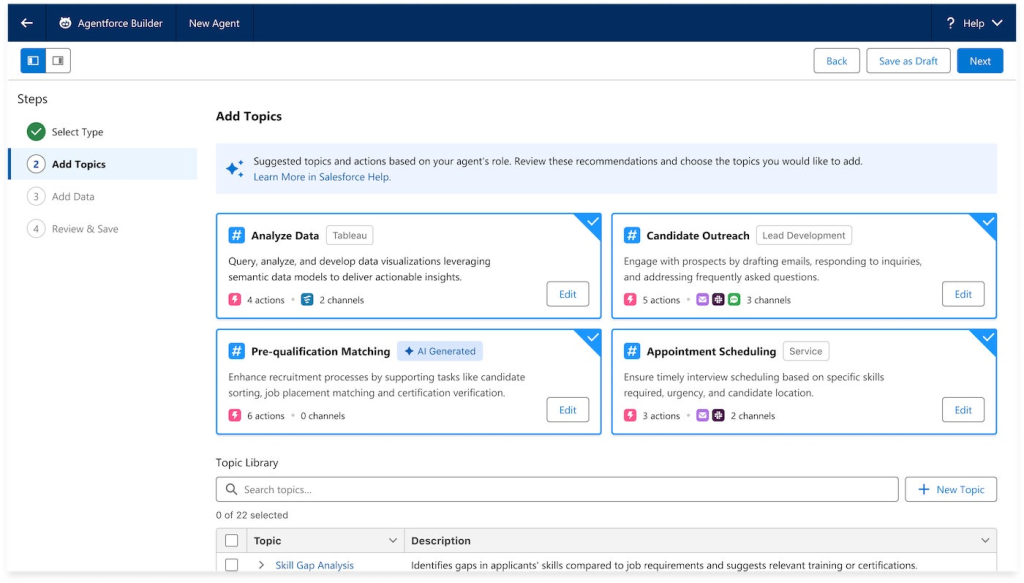On December 17, Salesforce introduced Agentforce 2.0, a cutting-edge iteration of its AI-powered platform designed to integrate customizable, semi-autonomous AI agents into enterprise workflows. The new version enhances capabilities, empowering businesses to streamline processes with an AI-driven workforce, capable of handling complex tasks across various departments.

What’s New with Agentforce 2.0?
Agentforce 2.0 offers an array of new features aimed at improving business operations. The platform’s core innovation lies in its ability to allow businesses to choose from a library of pre-built AI agents or create custom agents using natural language prompts. These agents can follow multi-step plans, adhere to conditional workflows (e.g., “if/then” statements), and execute actions across systems and applications seamlessly.
Key Features of Agentforce 2.0:
- Pre-built Skills: Salesforce has introduced several pre-configured skills for specific tasks, including Sales Development, Sales Coaching, Marketing Campaigns, and Commerce Merchant. These skills can help automate and streamline routine processes, significantly reducing the workload on human employees.
- Tableau Integration: Agentforce agents now offer Skills for Analytics and Insight within Tableau. These capabilities help businesses track and analyze agent performance, providing valuable data visualizations for enhanced decision-making.
- Slack Integration: Slack is deeply integrated into the Agentforce experience. Through Slack Actions, users can automate routine updates and have agents send project updates via direct messages. In January, the Agentforce Hub will be available within Slack, making it easier for teams to interact with AI agents, access relevant data, and automate tasks within Slack’s communication channels.
These features allow businesses to integrate Agentforce 2.0 directly into their existing tools, including Salesforce CRM, Slack, Tableau, and Mulesoft, creating a powerful, AI-powered digital labor force.
Customizing Your AI Agents with Natural Language Prompts
For businesses that don’t find an exact match in the pre-built library, Salesforce has introduced Agent Builder. This tool enables users to create custom AI agents using simple, natural language commands. For example, users can instruct the AI to “Onboard New Product Managers,” allowing businesses to tailor the system to their unique needs without technical expertise. Additionally, Slack Actions will be incorporated into Agent Builder, making it even more adaptable.
Integration of the Atlas Reasoning Engine
A major leap forward in Agentforce 2.0 is its Atlas Reasoning Engine, which powers advanced AI reasoning and retrieval-augmented generation (RAG). RAG allows the AI to access unstructured data and pull insights from various parts of the Salesforce Platform to deliver more nuanced and informed responses.
For instance, Salesforce highlighted an example where advanced reasoning could be used to answer a complex question like, “What investment vehicle would be best for my child’s college fund based on my current income and risk preferences?” Through RAG, Agentforce can retrieve data from across Salesforce systems to ensure more accurate, contextually relevant recommendations.
Expanding the Scope of AI in Enterprises
Salesforce’s emphasis on AI is evident in its vision to make Agentforce 2.0 the cornerstone of enterprise operations, allowing employees to focus on more value-added tasks while automating routine functions. The power of Agentforce 2.0 lies in its adaptability, making it applicable to virtually any business function, from customer service to marketing and HR.
Melik Khoury, president and CEO of Unity Environmental University, shared how his institution is leveraging Agentforce to improve workflows. By automating common queries, such as financial aid details or class registration, the university is freeing up staff time to focus on more personalized guidance for students. This represents a significant shift in how businesses and institutions can integrate AI for improved efficiency.
Looking Ahead: A Future of AI-Powered Digital Labor
Salesforce’s aggressive investment in AI tools like Agentforce 2.0 is part of a broader strategy to integrate generative AI into its entire suite of products. The company aims to provide enterprises with AI-driven solutions that not only automate basic tasks but also enhance decision-making processes with advanced reasoning. Claire Cheng, VP of Machine Learning and Engineering for Salesforce AI, stated that Salesforce expects the reasoning engine to become one of the key factors businesses will consider when evaluating digital labor options.
Availability and Next Steps
While Agentforce 2.0 will be fully available in February 2025, businesses can begin deploying it within Slack as early as January 2025. The expansion of generative AI into business workflows represents a new chapter for Salesforce and the AI industry, offering enterprises a flexible, powerful toolset to transform their operations with minimal manual intervention.